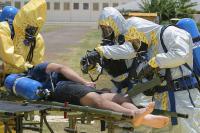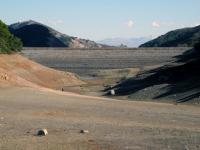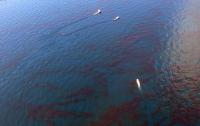-
Developing tests for radiation absorbed in nuclear emergency
In a large-scale nuclear or radiological emergency, such as a nuclear detonation, hundreds of thousands of people may need medical care for injuries or illness caused by high doses of radiation. To help save as many people as possible and better prepare the nation for the health impacts of such catastrophic emergencies, HHS will sponsor late-stage development of two tests, known as biodosimetry tests, which can determine how much radiation a person’s body has absorbed.
-
-
HHS bolsters U.S. health preparedness for radiological threats
The U.S. Department of Health and Human Services’ (HHS) Office of the Assistant Secretary for Preparedness and Response (ASPR) says that as a part of its mission to help protect Americans’ health following even the most unthinkable of disasters, it is purchasing two medical products to treat injuries to bone marrow in victims of radiological or nuclear incidents. Bone marrow is essential to producing blood.
-
-
New candidate vaccines against the plague show promise
The plague of Black Death infamy has had the power to strike fear in people since the Middle Ages — and for good reason. Once someone begins to show symptoms, the disease progresses very quickly and is almost 100 percent fatal without prompt treatment. Antibiotic-resistant Y. pestis strains have been isolated from plague patients and can be engineered for use as a bioweapon. Researchers have developed new potential vaccines that protect animals against the bacteria that causes the deadly plague.
-
-
Ambitious Baltimore water pollution clean-up project
Baltimore’s Inner Harbor and the urban rivers that flow into it are important sources of water to Chesapeake Bay, popular recreation sites for residents and tourists, and the targets of an ambitious clean-up plan to make the harbor swimmable and fishable by the year 2020. In a first for Baltimore and the nation, the U.S. Geological Survey and the Environmental Protection Agency will soon be installing a suite of sensors that will provide the public and scientists with the first comprehensive, real time look at water quality in Baltimore’s Inner Harbor.
-
-
Business cycle drives the spread of viral diseases
Next time a flu epidemic hits your area, putting everyone in bed, rejoice: it may mean that the recession is over. A new paper highlights the connection between the business cycle and the spread of viruses: “We find that epidemics spread faster during economic booms,” the paper says. “During booms more people are traveling, which increases inter-personal contacts and the spread of diseases.”
-
-
Even if the Paris Agreement is implemented, food and water supplies remain at risk
If all pledges made in last December’s Paris climate agreement (COP21) to curb greenhouse gases are carried out to the end of the century, then risks still remain for staple crops in major “breadbasket” regions and water supplies upon which most of the world’s population depend. Recognizing that national commitments made in Paris to reduce greenhouse gas emissions fall far short of COP21’s overarching climate target — to limit the rise, since preindustrial times, in the Earth’s mean surface temperature to 2 degrees Celsius by 2100 — a new report advances a set of emissions scenarios that are consistent with achieving that goal.
-
-
A military view on climate change: It’s eroding our national security and we should prepare for it
U.S. military leaders and defense planners have been studying climate change for years from a perspective that rarely is mentioned in the news: as a national security threat. And they agree that it poses serious risks. Here is how military planners see this issue: We know that the climate is changing, we know why it’s changing, and we understand that change will have large impacts on our national security. Yet as a nation we still only begrudgingly take precautions. The next president will have a choice to make. One option is to continue down the path that the Obama administration has defined and develop policies, budgets, plans, and programs that flesh out the institutional framework now in place. Alternatively, he or she can call climate change a hoax manufactured by foreign governments and ignore the flashing red lights of increasing risk. The world’s ice caps will not care who is elected or what is said. They will simply continue to melt, as dictated by laws of physics. But Americans will care deeply about our policy response. Our nation’s security is at stake.
-
-
Strengthening U.S. infrastructure to withstand disasters
The delivery of essential services — whether in food, water, health, or emergency response — relies increasingly upon a complex, interconnected system of critical infrastructure. Ensuring these interdependent systems continue to operate during disasters and other disruptive events is crucial to maintaining public health and safety. NSF announces $22.7 million in new investments to promote better understanding and functioning of these infrastructures in an effort to improve their resilience.
-
-
A nerve agent antidote taken before a chemical weapons attack

Nerve agents are molecular weapons that invade the body and sabotage part of the nervous system, causing horrific symptoms and sometimes death within minutes. Few antidotes exist, and those that do must be administered soon after an attack. Now, scientists an early-stage development of a potential treatment that soldiers or others could take before such agents are unleashed.
-
-
Megadrought lasting three decades likely for Southwest U.S., Midwest

The consequences of climate change paint a bleak picture for the Southwest and much of America’s breadbasket, the Great Plains. The role of climate change in causing extreme heat waves, drastic rainfall, negative impacts on human health, and threatened food security have received more attention recently than megadrought, but scientists view prolonged drought risk as yet another natural hazard that becomes more likely from human activity.
-
-
New technology pinpoints water contamination sources

When the local water management agency closes your favorite beach due to unhealthy water quality, how reliable are the tests they base their decisions on? As it turns out, those tests, as well as the standards behind them, have not been updated in decades. Now scientists have developed a highly accurate, DNA-based method to detect and distinguish sources of microbial contamination in water.
-
-
Slowing the spread of infectious diseases
Outbreaks of infectious diseases such as Zika increasingly threaten global public health. Scientists expect five such new diseases to emerge each year. To find out whether our interaction with the environment is somehow responsible, the Ecology and Evolution of Infectious Diseases (EEID) program — a joint effort of the National Science Foundation (NSF), National Institutes of Health (NIH), and the U.S. Department of Agriculture (USDA) — has awarded $16.6 million in new grants. The scientists receiving the grants will study disease transmission among humans, other animals, and environment.
-
-
Florida tightens public notification rules for pollution incidents
Last week Governor Rick Scott instructed Florida Department of Environmental Protection (DEP) Secretary Jon Steverson to issue an emergency rule that establishes new requirements for public notification of pollution incidents. The rule is to take effect immediately. Scott issued the instruction following the sewage spill in Pinellas County and the sinkhole at Mosaic’s New Wales facility.
-
-
Massive 2014 West Virginia chemical spill was preventable: CSB
The Chemical Safety Board’s (CSB) final report into the massive 2014 release by Freedom Industries of chemicals into the primary source of drinking water of Charleston, West Virginia, concludes that Freedom Industries failed to inspect or repair corroding tanks, and that as hazardous chemicals flowed into the Elk River, the water company and local authorities were unable effectively to communicate the looming risks to hundreds of thousands of affected residents, who were left without clean water for drinking, cooking, and bathing.
-
-
Abnormalities found in drinking water in Texas’s Eagle Ford Shale region
Chemists studying well water quality in the Texas’s Eagle Ford Shale region found some abnormal chloride/bromide ratios, alongside evidence of dissolved gases and sporadic episodes of volatile organic compounds, all indicative of some contamination from industrial or agricultural activities in the area.
-
More headlines
The long view
A Shining Star in a Contentious Legacy: Could Marty Makary Be the Saving Grace of a Divisive Presidency?
While much of the Trump administration has sparked controversy, the FDA’s consumer-first reforms may be remembered as its brightest legacy. From AI-driven drug reviews to bans on artificial dyes, the FDA’s agenda resonates with the public in ways few Trump-era policies have.
